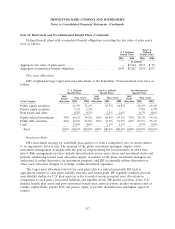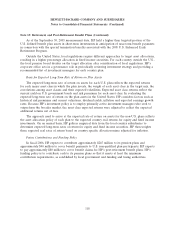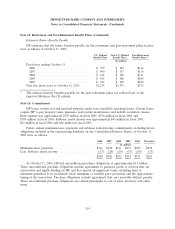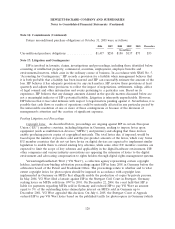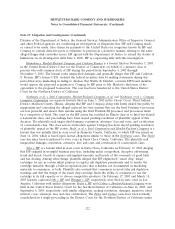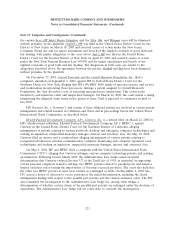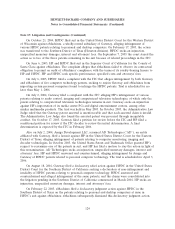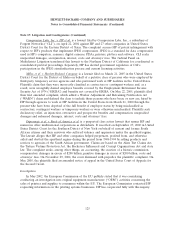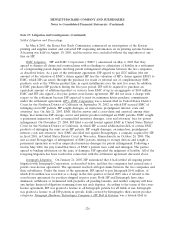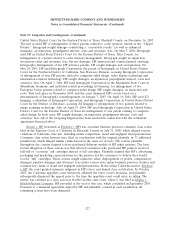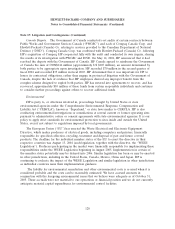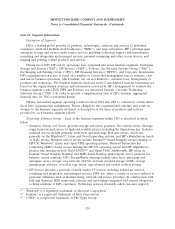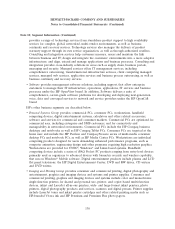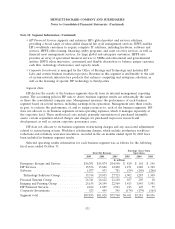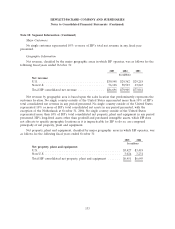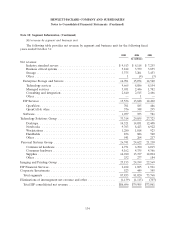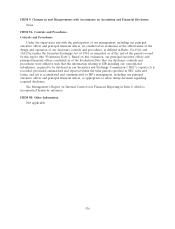HP 2005 Annual Report Download - page 131
Download and view the complete annual report
Please find page 131 of the 2005 HP annual report below. You can navigate through the pages in the report by either clicking on the pages listed below, or by using the keyword search tool below to find specific information within the annual report.
HEWLETT-PACKARD COMPANY AND SUBSIDIARIES
Notes to Consolidated Financial Statements (Continued)
Note 17: Litigation and Contingencies (Continued)
United States District Court for the Eastern District of Texas, Marshall County, on December 16, 2002.
The suit accused HP of infringement of three patents related to cache memory, known as the ‘‘Clipper
Patents.’’ Intergraph sought damages constituting a ‘‘reasonable royalty’’ (as well as enhanced
damages), an injunction, prejudgment interest, costs and attorneys’ fees. On May 7, 2004, Intergraph
sued HP in United States District Court for the Eastern District of Texas, Tyler County, for
infringement of a patent related to cache memory management. Intergraph sought an injunction,
declaratory relief and attorneys’ fees, but not damages. HP answered and counterclaimed, asserting
Intergraph’s infringement of two HP software patents. HP sought damages and an injunction. On
May 28, 2003, HP sued Intergraph Corporation, the parent of Intergraph, in United States District
Court for the Northern District of California, San Francisco Division, accusing Intergraph Corporation
of infringement of four HP patents related to computer-aided design, video display technology and
information retrieval technology. HP sought damages, an injunction, prejudgment interest, costs and
attorneys’ fees. On April 1, 2004, HP sued Intergraph Corporation in the Mannheim State Court in
Mannheim, Germany, and instituted related proceedings in Germany, for infringement of two
European Union patents related to computer-aided design. HP sought damages, an injunction and
costs. Trial took place in November 2004, and the court dismissed HP’s action based on a
determination of Intergraph’s noninfringement on January 7, 2005. On April 19, 2004, HP sued Z/I
Imaging, a subsidiary of Intergraph Corporation, and Intergraph Corporation, in United States District
Court for the District of Delaware, accusing Z/I Imaging of infringement of two patents related to
image scanning technology. Also on April 19, 2004, HP sued Intergraph Corporation in United States
District Court for the Eastern District of Texas for infringement of one patent relating to computer-
aided design. In both cases, HP sought damages, an injunction, prejudgment interest, costs and
attorneys’ fees. All of the foregoing litigation has been resolved in connection with the settlement
agreement discussed above.
Stevens v. HP (renamed as Erickson v. HP) was an unfair business practices consumer class action
filed in the Superior Court of California in Riverside County on July 31, 2000, which alleged various
violations of California state law, including unfair competition, fraud and negligent misrepresentation.
Consumer class action lawsuits were filed, in coordination with the original plaintiffs, in 33 additional
jurisdictions, which alleged similar claims based on the same set of facts. The various plaintiffs
throughout the country claimed to have purchased different models of HP inkjet printers. The basic
factual allegation of these actions was that affected consumers who purchased HP printers received
half-full or ‘‘economy’’ ink cartridges instead of full cartridges. Plaintiffs claimed that HP’s advertising,
packaging and marketing representations for the printers led the consumers to believe they would
receive ‘‘full’’ cartridges. These actions sought injunctive relief, disgorgement of profits, compensatory
damages, punitive damages and attorneys’ fees under various state unfair business practices statutes and
common law claims of fraud and negligent misrepresentation. In the initial California matter, Erickson
v. HP, the court granted summary judgment in HP’s favor and denied class certification. In October
2003, the California appellate court tentatively affirmed the lower court’s decisions, and plaintiffs
subsequently dismissed the appeal prior to the time the appellate court could enter its ruling. The
matter was certified as a class action in North Carolina state court, where it was filed as Hughes v.
Hewlett-Packard Company. HP prevailed at the trial of this case, which concluded in September 2003.
Pursuant to a dismissal agreement signed by HP and plaintiffs’ counsel in each jurisdiction, all
remaining actions have been dismissed.
127


